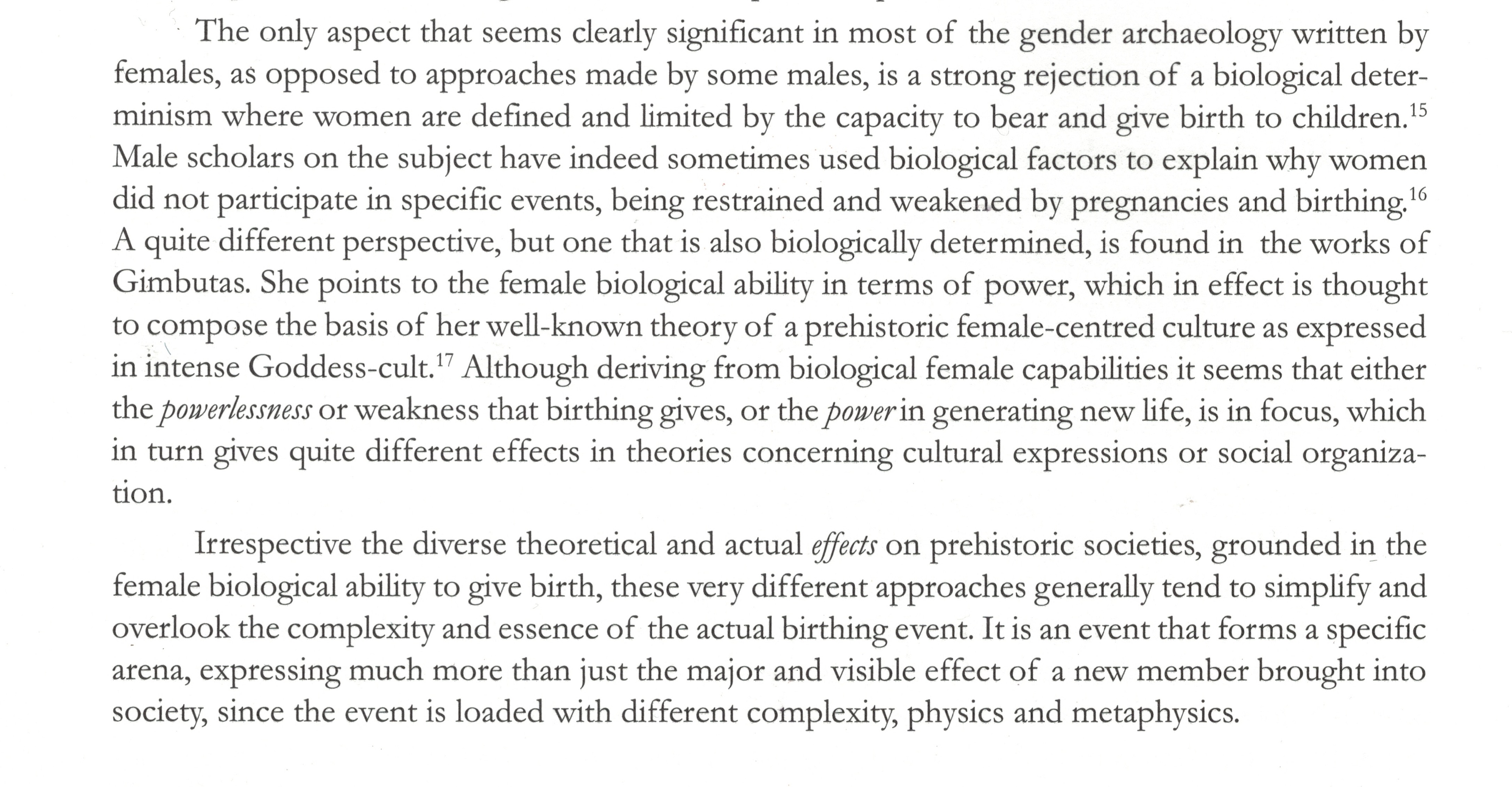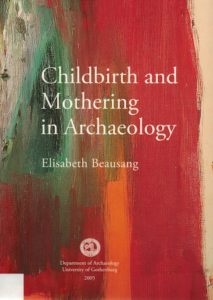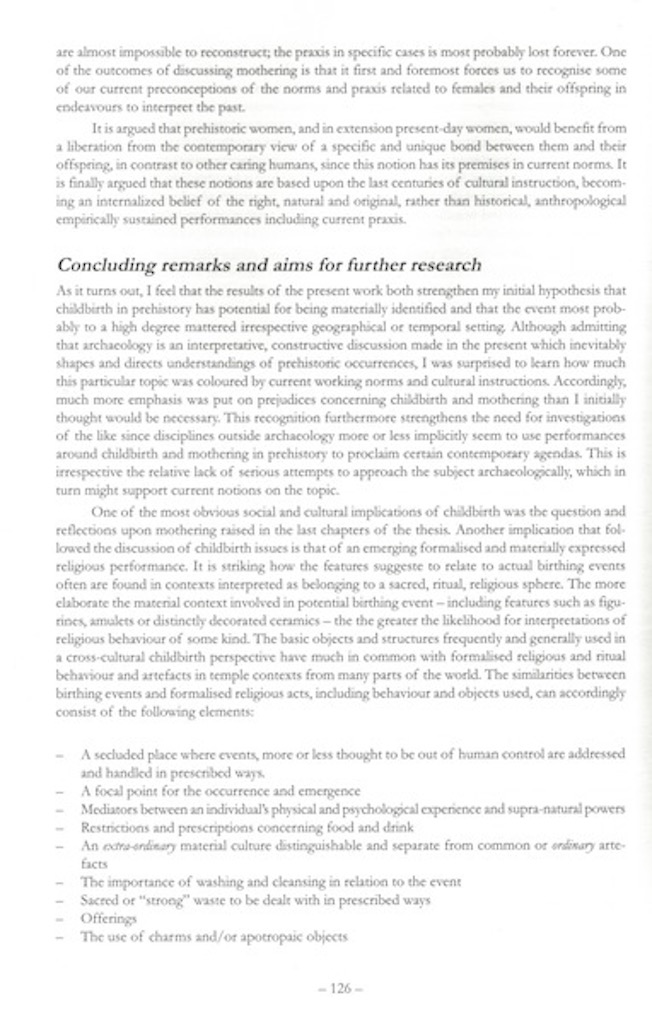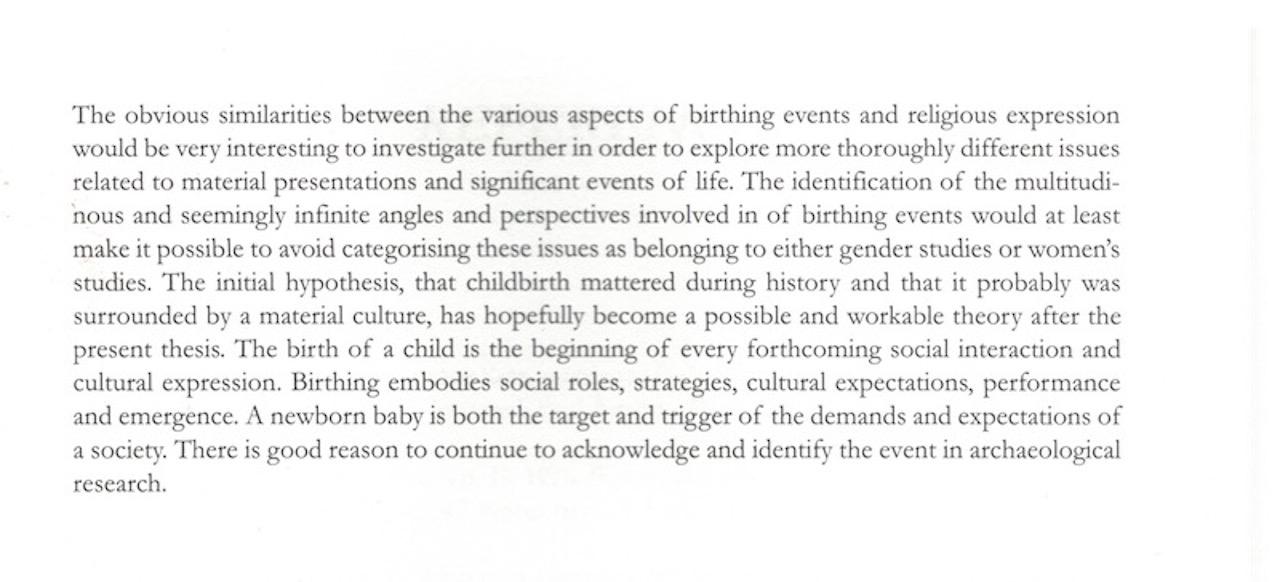Se även Elisabeth Beausang uppsats på
LÄRARUTBILDNINGEN INDIVID OCH SAMHÄLLE
Examensarbete 15 poäng
PÅ SPANING EFTER DET URSPRUNG SOM FLYTT »
G E N D E R A R C H A E O L O G I S T
E L I S A B E T H B E A U S A N G
Att detta klassificeras som “vetenskap” är genant.
I sin doktorsavhandling om Childbirth and Mothering in Archaeology underlåter dess upphovskvinna Elisabeth Beausang konsekvent att göra ngn kvalitativ analys av begreppet “poisoned” i förhållande till det tabu som kvinnorna initialt ålagt sig i fråga om sina menstruerande perioder. Istället använder hon begreppet totalt odifferentierat genom hela doktorsavhandlingen utan att med ett enda ord låta avslöja att synen på detta tabu förändrades radikalt från att ursprungligen ha förestått idén om en magisk laddning av gudinnligt generativ kraft så stark att den måste hållas åtskild från övrigt och övriga i samhället - i den hemliga avsikten att skapa ett avskilt utrymme åt den systerliga motmakten, mot mäns tendens att dominera, att konsolidarisera sig.
Att det först är efter den patriarkala övermakten som mensblodet degraderats till ngt “smutsigt” eller “giftigt” underlåter hon att gå in på öht, vilket måste betraktas som ett resultat av intellektuell oärlighet då en av hennes referenser är den professor Chris Knight i RAG vars forskning just handlar om hur denna övergång gick till genom att tex vissa patriarkala stammars män började skära upp sina penisar för att de skulle blöda och därigenom usurpera kvinnors motmakt etc etc, publicerat i hans kända verk Blood Relations. Det står naturligtvis Beausang fritt att ifrågasätta hans teoribildning, om hon anser sig ha vetenskapligt grundade skäl för det, men istället underlåter hon att nämna den öht.
Man ställer sig om och om igen frågan hur det komma sig att forskare som menar sig förestå kvinnors intressen och vars självpåtagna genderuppdrag är att rehabilitera kvinnornas gömda och glömda historia, tvärtom bara ignorerar den genom att underlåta att lägga fram de teorier till granskning som gör anspråk på att kunnat påvisa, att det är just de som i egenskap av autonomt självförsörjande, samarbetsinriktade och kulturskapande potenta mödrar har danat den mänskliga kulturen eller samhällets ursprung.
Det syns dessutom en klart biased tendens redan i inledningen av doktorsavhandlingen, då hon efter den numera givna proceduren i avhandlingar med gendervetenskapligt innehåll, att lägga två fingrar på Bibeln och spotta tre gånger för att redan i ett av dess allra första stycken markera att hon tillhör den tappra skara som stått pall inför lockropen av den otrogna och brännmärka hennes hedniska kätteri. Att kvinnor under neolitikum skulle kunna tänkas ha identifierat sig med ngn slags “power” i förhållande till sina reproduktiva funktioner är naturligtvis ett satans påfund som måste avvisas med besked. Om det nu är det som Beausang vill ha sagt med följande vilket inte är alldeles givet - eller vad?

Och frågan man då ställer sig är ju naturligtvis hur någon kan göra anspråk på att veta det?
Fast den ges det inget svar på någonstans i hela denna avhandling.
... assessing highly qualified and recognised academics as "popular-scientists" because of their civilisation critics and / or research about matriarchal and / or egalitarian societies and / or even research about health care in regard of the most optimal kind of nourishment.
The Swedish archaeologist Elisabeth Beausang seems to get well along with the rest of the contemporary feminist gender archaeologists & anthropologists , who refute Gimbutas theorising as "essentialist", advertising her dismissing attitude thereof already in the introduction of her dissertation: Childbirth and Mothering in Archaeology, 2005 at page six:
"A quite different perspective, but one that is also biologically determinated, is found in the works of Gimbutas. She points to the female biological ability in terms of power, which in effect is thought to compose the basis of her well-known theory of a prehistoric female-centered culture as expressed in intense Goddess cult. "

This is not only totally erroneous, as Gimbutas never pointed to some female biological ability more than any other kind of biological ability in human beeings whatsoever, but also makes up quite a confusing message in the prevailing context. Because if its going to deal with childbirth, why then make such fuss about the biological concept, as its hard to think of anything more fundamentally biological than just that: childbirth. What´s so damned frightening about that? Why being so extremely wary of the inevitable fundamental biological processes in us all as the kind of biological creatures we all are, whether women or not?
Furthermore it is an extremely inadequate summary of the extensive work of one of the greatest archaelogist in the 20th century diminishing it be grounded on such an ambiguous term / phenomenon as "power" without making the slightest effort to distinguish what kind of power it is meant to deal with. Exactly as is the case with Meskell, which Beausang refer to as a trustworthy authority on the matter, she just seem to refute the idea of women being able to wield any kind of "power" at all, wether its about their biological "power" to bring forth new life or power in economic, political, cultural and religious sense, but without telling us why and how they would know that better than Gimbutas and / or anyone else. Not at least the English anthropologist professor Chris Knight, to whose extensive work: Blood Relations, she also refers, although omitting his main theory about the origin of society emerging out of the sexstrikes women have used in order to resist male dominance and set their own agenda, as well as the primordial view on menstruation as a very powerful force rendering women high statues as equippped with the ability to transform blood into new life, while men on the contrary had to shed blood when killing animals in the hunt.
Instead she is referring to the phenomenon of menstruation totally undifferentiated as a general problem of being "poisoned", without any specification of whether its in the primordial sense of being equipped with a mighty positive but dangerously challenging power, or in the second patriarchal depreciative sense of being "unclean".
And beyond this; its also hard to understand in what way one may apply a "biologically determinated perspective" on human history, Because whether dealing with women´s or men´s history we are all doomed to be born and die, and there between to live our lives as men or as women; in primordial times the former doing the job of men; mostly the hunting and fishing, when women were doing theirs; mostly gathering and preparing the food and taking care of and raising kids, being both schoolteachers, philosophers, psychologists, physisists, chemists, weavers, housebuilders, culture workers, musicians, dancers, healers, shamans, judges a.s.o, as is demonstrated to be the case among most hunter and gatherers all around the globe so far, with some very few exceptions, not at least through the extensive field work carried out during the last decades by the English anthropologist Jerome Lewis and others among the forest living hunter and gatherer in Central Africa and South East Asia. In his lecture in one of RAG:s (Radical Anthropology Group) meetings he mentioned the earlier field work of the English anthropologist Karen Endicott in the 70th among the egalitarian forest-living: not being believed by her colleagues; accusing her of lying about her observations among this people, which made her quit her further academic career, not publishing her findings among this peaceful and egalitarian people until 2007 - i.e. about thirty years later.
Beyond this quite remarkable example of disregard for ones hard working colleague´s seriousity sand honesty, to which Jerome Lewis reports he himself also have been exposed, it could here be added that the modern gender-archaelogists and anthropologists of the thirdwave generation share exactly the same arrogant and ignorant attitude, by depreciating the first anthropologists out on the field in the 19th century and before that, as simple storytellers and liars, due to their reporting of the matriarchal societies they had encountered far away abroad in the countries they had visited.
Then she continues with the following sentences full of totally incomprehensible dangling modifiers:
"Although deriving from biological female capabilities it seems that either the powerlessness or weakness that birthing gives, or the power in generating new life is on focus, which gives quite different effects in theories concerning cultural expressions or social organisation."
Whose focus, when and why and on what, and why not either powerlessness or power? "Although deriving from female capabilities" its either that or that. So why not? "Although deriving from female capabilities" - which capabilities and why specifically "female" if not biologically derived?
These sentences are all of them typical for Elisabeth Beausang´s way of expressing herself, also in her following academic essay from 2009 at Lärarhögskolan in Malmö (the academic education for teachers) (scroll down) in the sense that most of them, as well as the fundamental message they aim to transmit is totally incomprehensible.
"The only aspect that seems clearly significant in most of the gender archaeology written by females, as opposed to approaches by some males is a strong rejection of biological determinism where women are defined and limited by the capacity to bear and give birth to children."
So far its no problem to catch up, as its easy to understand that female researches say no thanks to the limited role of just acting as breeders and sex - and workslaves given to them in patriarchy. There are certainly no reason to portray women as less competent and actively contributing to the cultural evolution as men, quite the contrary so as we shall see later, and is so eminently exposed by no other than at least Marija Gimbutas herself, reporting of a women-made - culture through and through. And the fact that male bias in history writing often has given rise to hiding these historical as well as contemporary events, is totally logically consequent, viewed from its fundamentally ideological outset; to compete, instead of cooperate with the former sacred institution of nurturing and caretaking motherhood, as well as the sacred and abundant nature, together with which she was considered to be one and the same - all these intricate mechanisms, exemplarily dissolved and displayed in the field of modern matriarchal studies, as well as by the RAG-anthropologists in England; Chris Knight and Jerome Lewis et al. So why no one of its critics are conversant with it, is a really enigma and certainly not compatible with an acceptable scientific approach.
Because who said that the patriarchal type of father´s role would be less "biological" than the first sacred mother-related one? Isn´t the alleged need among the human males as well as the further hominids to dominate females, considered to be a universal trait in the human outfit and inherited from the chimpanzees, not at least by the contemporary gender archaeologists & anthropologists themselves such as for example Cynthia Eller, Conkey & Tringham, Meskell , Röder, Knauss , Håland & Håland et. al., thereby walking hand in hand with the dominance-adicted patriarchalists themselves - or perhaps just demonstrating their normal biological female subordinate carriage?
Why otherwise these highly farfetched narratives messing things up so incredibly, by pretending themselves to be able to bear their daughters and wifes out of their foreheads and / or ribs etc. etc? In Australia some native men even pretend to be menstruating although, cutting up their penises to bleed, telling the women that their menstruations is nothing compared to their own suffering.
Then she continues:
"Male scolars on the subject have indeed sometimes used biological factors to explain why women did not participate in specific events, being restrained and weakened by pregnancies and birthing."
It doesn´t sound too bad to me though: Its obviously not the established hegemony of archaeology as a whole, that´s being alleged as the real problem here, but just some few male individuals without any greater importance who hasn´t got it right. I suspect that´s the reason why none of them even is mentioned by name. None of them seem simply to be important enough - as the only reference added to it is "Randsberg 1984", i e. 25 years old literature on a subject that was started up just by then.
I ask myself: Isn´t it a factuality that the gendered spritual & labour division in hunter & gatherer societies such as for example these T H E P E A C E F U L & E G A L I T A R I A N H U N T E R & G A T H E R E R S investigated by anthroplogist Jerome Lewis, or Chris Knights research about women´s menstruational power "Blood relations", as well as Akan and Bijagos in West Africa, Bemba, Luapula and other still existing agrar- and horticultural matriarchies among the Bantu people and others in Central Africa, as well as in Asia and America as for example Khasi, Mosuo, Minangkabu, Kuna, Zapotec in Juchitan etc etc participate in certain events although the reason to that is not them being considered weaker but just too powerful?
And secondly; on behalf of what kind of competence does Beausang possess legitimacy to dismiss knowledge about that and assess its predecessors as "popular scientists", in the position of an undergraduate student in archaeology, and the subject she is dealing with is to be classified as a topic of social science and humanities and her own discipline; archeology, as it´s carried out in the contemporary andro- and ethnocentric Western postprocesseual discourse, doesn´t offer any training either in social science, humanities or methodological qualitative approach, as is strongly emphasised and regretted in the German gender-archaeopogist prof. Brigitte Röders work: Göttinendämmerung.
I will return to this issue later, as I the last month have tried to get in contact with five of the professors in the discipline of archaeology in Sweden for to ask them about their opinion about Beausang´s statements, of whom just one have had the courage to answer at all!
Quite the contrary it becomes evident that the archaeologists of today who claim themselves to enjoy representantship of the "majority" of the established science community and represent the "consensus" among modern archaeology & anthropology as well as history and religion science, do that on behalf of the misconception, that their own extremely narrowminded reductionist perspective would be the only one representing "science" at all, while all their opponents would represent so-called "popular science" or just being "unscientific" whatsoever.
That´s how far away from reality contemporary so called "science" have drifted away since the systematically downgrading of the social sciences and humanities has been in steady progress during the last decades.
Many of the contemporary archaeologists who hasn´t got a clue about humanities and social science seem to regard themselves as the legitimate science philosophical authorities to assess what might be delineated as real "science" or not, even in disciplines as far away from their own narrowminded scientistic reductionist archaeologist perspective as art and mythology. An attitude which in Beausang´s case even ends up in delivering the directives to the authors of our school curriculum about what is to be classified as "unscientific" and / or "popular sciences" among these disciplines´s representants, thereby disqualifying academic scholars with valid qualifications as far beyond her own as the ones of Marija Gimbutas, highly recognised by the most otstanding scholars in religion and mythology such as for example the archaeologist and mythologist Kristina Berggren an James B Hoddar as well as a whole series of other well recognised scholars all over the world presented by Joan Marler.
Its highly indigestible to realise the existence of this totally unwarranted selfsecurance among the whole bunch of incompetent scholars in archaeology & anthropology dismissing highly competent and qualified scholars far beyond their own blinkered outlook in every sense, thereby also denying the most apparent facts about more or less matriarchal or egalitarian societies existing in the world even today.
And last but not least; who is the "essentialist" or "biologist" who cannot differentiate between what is gender created by a mothercentered ideology applying for everyone; for women and children and men as well and / or biological inherited features as for example the ones being applied to the male sex by themselves and their own biased "science" of always having to dominate women? An opinion pursued by the contemporary "feminists" and so called "gender" - archaeologists and anthropologists today - and the consequently projected onto the hated "mothers". What then is this alleged overall and universal feature of male dominance, if not a biological one?
Quite the contrary of representing some kind of more pure "scientific" perspective than the scholars in social scienties humanities its obvious that male stream Western archaeology & anthropology has declined to some kind of sectlike scientism type the one Vof and the sceptic-movement and Dawkins et al represents. But that hasn´t got anything to do with real science in the sence we are using the term today, contrary to the one from the childhood of modern science in the 16th centry and onwards during the following three hundred years.
Its hard to understand from what kind of contemporary trend this misconception of the discipline of archaeology as such an authoritatively field of science as to pertain their pursuers with such a strong selfconfidence of being enthroned on some kind of scientifical seat of honour to asses all further kind of scientific activities; although themselves not even having the slightest clue of fundamental basics in philosophy of science and methodology and not even the fundamental rule in science to of search for the truth instead of telling lies about their colleagues hard endeavors bringing about high qualified scientific research about our common human historical background.

